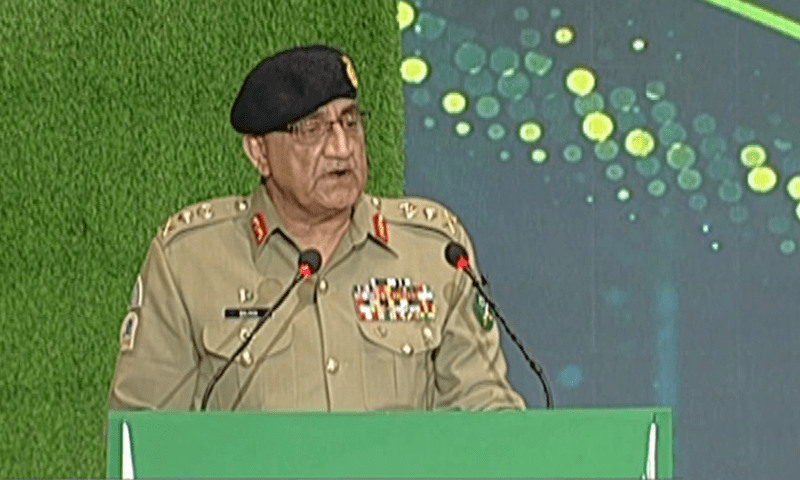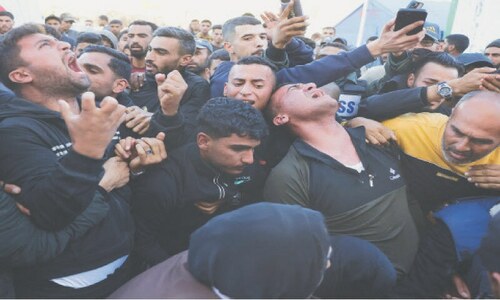In his last public address, COAS Bajwa slams anti-army narrative, asks political stakeholders to move forward

Gen Qamar Javed Bajwa, in his final public address as the army chief, criticised anti-military narrative and urged political stakeholders to set aside labels of ‘imported’ and ‘selected’ to move forward for the country’s sake.
The army chief made these remarks on Wednesday during his speech at the Defence and Martyrs day ceremony, which is held annually at the General Headquarters (GHQ) Rawalpindi on September 6 to commemorate the sacrifices of fallen heroes of the 1965 war. However, it was postponed this year in solidarity with flood victims across the country and rescheduled for today.

“Today, I am addressing the Defence and Martyrs Day as the army chief for the last time,” Gen Bajwa, who is set to retire by November 29, said at the start of his speech. “I am retiring soon. This time, this [ceremony is being held] after some delay.”
‘Army’s interference in politics for 70 years’ made it target of criticism
He dedicated a major portion of his speech to political matters, saying that he often wondered that the Indian army carried out the most human rights violations in the world but “their people seldom make them the target of criticism”.
“In contrast to that, our army which day and night remains busy in serving the nation, is often made the subject of criticism,” he said. “A major reason for this is the army’s interference in politics for the last 70 years which is unconstitutional.
“This is why in February last year the army, after great deliberation, decided that it would never interfere in any political matter. I assure you we are strictly adamant on this and will remain so.”
‘False narrative was created, from which an escape is now sought’
The army chief said that instead of welcoming the military’s decision, “many sectors used very inappropriate and undignified language while making the army the target of severe criticism.”
“To criticise the army is the right of [political] parties and the people, but the language used [should be careful],” he said.
Gen Bajwa said that a “false narrative was created”, from which “an escape is now being attempted”.
He said the army had initiated its process of “catharsis” and expected that political parties would follow suit as well and reflect on their behaviour. “This is the reality that there have been mistakes from every institution, including political parties and civil society.”
The COAS said that lessons should be learned from such mistakes so the nation could move forward.
‘Time’s come for political stakeholders to set aside ego, move forward’
Gen Bajwa said the country was facing “serious economic” issues and no one party could take the country out of the financial crisis.
“Political stability is mandatory and the time has come for all political stakeholders to set aside their ego, learn from past mistakes, move forward and take Pakistan out of this crisis.”
He stressed the need for the nation to shed intolerance and adopt a “true democratic culture”.
Gen Bajwa rued the political parties’ criticism, first after the 2018 general elections and then again following the successful vote of no confidence this year, recalling that whoever lost branded the other as either “selected” or “imported”.
“We need to reject this behaviour,” he said. “Victory and defeat are part of politics and every party will have to develop the strength to accept its victory as well as defeat so an elected government comes in the next election instead of an imported or selected one.”
He said that if Pakistan wanted to move forward then it would need to shun intolerance and the attitude of “I don’t accept”.
The COAS lauded the sacrifices of martyrs and praised their families, saying that the army would “continue to serve and protect the country”.
At the onset of the event, a tribute video was played about the recent catastrophic floods in the country and the scale of destruction they caused. The video also showcased the military’s rescue, relief and rehabilitation efforts.
‘East Pakistan was a political failure, not military one’
Gen Bajwa also discussed the army’s performance and actions in Bangladesh during the 1971 civil war, which said were topics that most people avoided.
“I want to correct some facts here. Firstly, former East Pakistan was a political failure and not a military one,” he said.
He said the number of soldiers fighting was not 92,000 but 34,000 and the others were in different government departs. He added that these 34,000 soldiers were confronted by an Indian army of 250,000 soldiers and 200,000 members of the Mukti Bahini.
“Against these heavy odds, our army fought bravely and gave exemplary sacrifices which were acknowledged by Indian army chief field marshal Manekshaw.”
He said the nation had yet not owned up to these sacrifices which was a “great injustice”. “Taking advantage of this occasion I salute these martyrs and will continue to do so. They are our heroes and the nation should be proud of them,” Bajwa added.
Gen Bajwa will be retiring by the end of the month after commanding the army for six years. He was appointed army chief in 2016 for a three-year tenure, which was extended by another three years after parliament legislated on the tenures of services chiefs on the orders of the Supreme Court.
















































